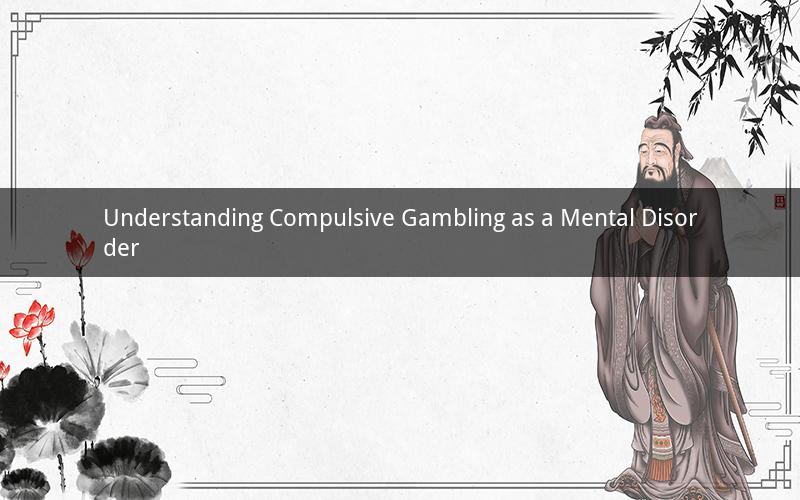
Compulsive gambling, also known as gambling addiction, has gained significant attention in recent years as a potential mental disorder. This article delves into the definition, symptoms, causes, and treatment options for compulsive gambling. Additionally, we will discuss the impact of this disorder on individuals and society.
1. Definition of Compulsive Gambling
Compulsive gambling is characterized by an irresistible urge to gamble, despite the negative consequences it may bring. It is a disorder that affects both the individual and their loved ones. Those struggling with compulsive gambling may experience intense cravings, loss of control, and a persistent desire to keep gambling, even when it leads to financial, social, and emotional problems.
2. Symptoms of Compulsive Gambling
Several symptoms can help identify compulsive gambling as a mental disorder. These include:
a. Preoccupation with gambling: The individual constantly thinks about gambling, planning their next betting session, or reliving past gambling experiences.
b. Loss of control: Attempts to stop or control gambling are unsuccessful, and the individual may continue to engage in the activity despite knowing the negative consequences.
c. Increasing amounts of money and time spent on gambling: Individuals may need to bet more money or spend longer periods of time to achieve the same level of excitement.
d. Repeated failed efforts to stop gambling: Despite numerous attempts to quit, the individual continues to engage in the activity.
e. Lying to hide gambling: Individuals may lie to friends, family, or professionals about their gambling habits to conceal their addiction.
f. Risking or losing relationships, jobs, or education: Compulsive gamblers may prioritize gambling over other important aspects of their lives, leading to strained relationships and job loss.
g. Risky or desperate behavior to obtain money: Individuals may turn to illegal activities, theft, or borrowing money to fund their gambling addiction.
3. Causes of Compulsive Gambling
Several factors can contribute to the development of compulsive gambling as a mental disorder. These include:
a. Genetic predisposition: Research suggests that a genetic component plays a role in the development of compulsive gambling.
b. Environmental factors: Growing up in a family with a history of gambling or exposure to gambling activities may increase the risk of developing an addiction.
c. Personality traits: Certain personality traits, such as impulsive behavior and low self-esteem, may make individuals more susceptible to compulsive gambling.
d. Mental health disorders: Comorbidity with other mental health disorders, such as depression, anxiety, or substance abuse, can increase the risk of developing a gambling addiction.
4. Treatment Options for Compulsive Gambling
Treating compulsive gambling as a mental disorder involves a combination of therapy, support groups, and lifestyle changes. Here are some common treatment options:
a. Cognitive-behavioral therapy (CBT): This type of therapy helps individuals identify and change negative thought patterns and behaviors associated with their gambling addiction.
b. Family therapy: Family therapy can help improve communication and support between the individual and their loved ones, fostering a healthier environment.
c. Support groups: Joining a support group, such as Gamblers Anonymous, can provide individuals with a sense of community and support from others who have experienced similar struggles.
d. Medication: In some cases, medication may be prescribed to help manage underlying mental health disorders or reduce the urge to gamble.
5. Impact on Individuals and Society
Compulsive gambling has a significant impact on both individuals and society. Here are some consequences:
a. Financial: Individuals may suffer from severe financial losses, leading to bankruptcy, debt, and foreclosure.
b. Emotional: Compulsive gamblers may experience feelings of guilt, shame, and depression, which can lead to relationship problems and a decline in overall well-being.
c. Social: Compulsive gambling can strain relationships with family and friends, leading to social isolation and alienation.
d. Health: The stress and anxiety associated with compulsive gambling can lead to physical health issues, such as heart disease, hypertension, and sleep disorders.
e. Legal: Individuals may face legal consequences, such as arrest, imprisonment, or fines, due to their gambling-related activities.
In conclusion, compulsive gambling is a mental disorder that requires proper identification, treatment, and support. By understanding the symptoms, causes, and treatment options, we can help individuals struggling with this addiction and mitigate its impact on their lives and society.
Questions:
1. How can someone determine if they have a gambling addiction?
2. What are the long-term effects of compulsive gambling on an individual's financial stability?
3. Are there any specific risk factors that make someone more susceptible to developing a gambling addiction?
4. How can family and friends support someone with a gambling addiction?
5. What are some alternative activities that individuals can engage in to replace their gambling habits?